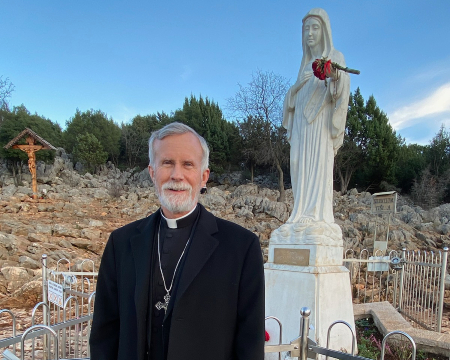 Hi readers, it seems you use Catholic Online a lot; that's great! It's a little awkward to ask, but we need your help. If you have already donated, we sincerely thank you. We're not salespeople, but we depend on donations averaging $14.76 and fewer than 1% of readers give. If you donate just $5.00, the price of your coffee, Catholic Online School could keep thriving. Thank you. Help Now >
Hi readers, it seems you use Catholic Online a lot; that's great! It's a little awkward to ask, but we need your help. If you have already donated, we sincerely thank you. We're not salespeople, but we depend on donations averaging $14.76 and fewer than 1% of readers give. If you donate just $5.00, the price of your coffee, Catholic Online School could keep thriving. Thank you. Help Now >
Catholics, Celebration and Freedom: In Praise of the Pig
FREE Catholic Classes
The Catechism of the Catholic Church (§ 582) states: "Jesus perfects the dietary law, so important in Jewish daily life, by revealing its pedagogical meaning through a divine interpretation," essentially abrogating the restrictions, or, perhaps better deepening their meaning, as inconsequential in the light of the Gospel which deals not with matters of the stomach, but with matters of the heart.
Highlights
Catholic Online (https://www.catholic.org)
1/18/2013 (1 decade ago)
Published in Living Faith
Keywords: Islam, pig, Belloc, Chesterton, dietary restrictions
CORPUS CHRISTI, TX (Catholic Online) - Towards the end of his marvelous travelogue and curious recount of his pilgrimage to Rome entitled The Path to Rome, Hilaire Belloc wrote about a black-haired Italian peasant driving a two-wheeled cart, whom Belloc hailed while taking a break from his pilgrimage and eating some sausage and drinking seated on a small wall in the vicinity of Lake Bolsena.
The peasant stopped beside Belloc, and Belloc resolved to take the cart, though it violated his vow never to take a wheeled thing on his pilgrimage to Rome (that is, if one followed the strict letter of the vow).
The two had a grand old time. The Italian sang songs in his Italian, and Belloc sang songs, I'm sure in both English and French, in return. They did not understand each other he says, yet "there was wine in common between us, and salami and a merry heart," remembered Belloc. He recalled it as "a good drive, an honest drive, a human aspiring drive, a drive of Christians, a glorifying and uplifted drive, a drive worthy of remembrance for ever."
We might be sure that part of the marvel of this part of Belloc's journey was due to the Catholic faith which bound the two travelers, but also that part of the mystique might be attributed to the wine and the salami shared between the simple Italian peasant and the educated Balliol man.
Belloc gave, in fact, a theological justification for it: "And what is more," Belloc observes, "by drinking wine and eating pig we proved ourselves no Mohammedans; and on such as he is sure of, St. Peter looks with a kindly eye."
Drinking wine and eating salami were symbols of the reality which lies behind the Catholic Christian creed so perfectly put by St. Paul in his letter to the Galatians: "It is for freedom that Christ has set us free." We are free of the impediments of dietary restrictions so as to be free for the greater things.
It is part of what makes a Catholic culture a Catholic culture. The Ayatollah Khomeni is reputed to have said during a radio show: "Allah did not create man so that he could have fun. . . . There are no jokes in Islam. There is no humor in Islam. There is no fun in Islam. There can be no fun and joy in whatever is serious." I am convinced that the Ayatollah says this because he thinks that God forbids him wine and bacon.
Ayatollah Khomeni's view of life is an incomprehensible sentiment to the Catholic, in particular one as ebullient and full of the joie de vivre as Belloc, who sees the world and all that is in it (except the sin)--in the main, with all its flaws, and despite the suffering--as good and worthy of celebration! As he wrote in some doggerel:
Wherever the Catholic sun doth shine,
There's always laughter and good red wine.
At least I've always found it so.
Benedicamus Domino!
Belloc could also have added something about salami, and, with his leave, I'll amend his doggerel to add it:
Wherever the Catholic sun doth shine,
There's always salami and wine,
At least I've always found it so.
Benedicamus Domino!
The French have a saying--of which, I'm sure Belloc was not unaware and would totally agreed, inasmuch as he loved bacon as well as his salami--Tout est bon dans le cochon. Everything is good about the pig. This is a Catholic truth, because the Catholic knows that God made the pig, and all things that God has made are good.
Belloc's good friend, G. K. Chesterton, had a few good things to say about the pig. This stands to reason since they usually saw eye to eye:
"To begin with," Chesterton wrote in an article in the Illustrated London News, "pigs are very beautiful animals. . . . The actual lines of a pig (I mean of a really fat pig) are among the loveliest and most luxuriant in nature; the pig has the same great curves, swift and yet heavy, which we see in the rushing water or in rolling cloud."
Of the main bodies of monotheists in the world, it is only the Christian that can say such a thing. For both the Jew and the Muslim, the pig is an impure thing.
"The pig," it says in Leviticus, "which does indeed have hoofs and is cloven-footed, but does not chew the cud and is therefore unclean for you." (Leviticus 11:6-7)
As if the prohibition were not enough, Deuteronomy repeats the dietary restriction: "The pig, which indeed has hoofs and is cloven-footed, but does not chew the cud and is therefore unclean for you. Their flesh you shall not eat, and their dead bodies you shall not touch." (Deuteronomy 14:8)
Jesus, of course, famously taught that food and drink did not render a man unclean, as food--whatever the food may be--does not enter into his heart, but only into his belly, and that "goeth out in the privy," as the Douay Rheims delicately puts it.
In this, the Gospel says, Jesus declared all foods clean thereby declaring that the Jewish law was not an absolute way to God, but was merely pedagogical. And now that the Way was here, there was no longer need for the way that pointed to the Way.
Jesus, with the authority of God himself, purged all foods from any hint of uncleanness or impurity. Purgans omnes escas. (Mark 7:9)
The Catechism of the Catholic Church (§ 582) states: "Jesus perfects the dietary law, so important in Jewish daily life, by revealing its pedagogical meaning through a divine interpretation," essentially abrogating the restrictions, or, perhaps better, deepening their meaning as inconsequential in the light of the Gospel which deals not with matters of the stomach, but with matters of the heart.
In short, you can eat pig, or hog, or swine, or boar. Just don't be a pig, or a hog, or a swine, or a boar. Overindulgence, greed, moral impurity, and violence are proscribed by the law of Christ, not the eating of God's good meat.
Customs die hard. It seems that even in St. Peter, the Jewish dietary customs had to be drilled out of him by a vision at Jaffa in which he saw a large sheet being let down by animals held unclean--we may be sure the included the pig--and he was told to slaughter and eat. "Certainly not, Lord. For never have I eaten anything profane and unclean." But the Voice insisted: "What God has made clean," and that can have reference only to Jesus and his teaching, "you are not to call profane." (Acts 10:13-15)
St. Paul, who had to remind St. Peter of the Lord's view on diet, warned the early Christians to avoid those who depart from the faith, give heed to "deceitful spirits" and "demonic instructions" through the "hypocrisy of liars with branded consciences." Part of what might be expected from such disreputable fellows, St. Paul warns, are supposed claims to divine commands that "require abstinence from foods that God created to be received with thanksgiving by those who believe and know the truth." (1 Tim. 4:1-3)
This includes the pig. God bless the pig! Let us, who know the truth, receive the pig as did Belloc and Chesterton, with thanksgiving. Benedicamus Domno pro sus!
The Christian knows what any Frenchman knows: tout est bon dans le cochon! We have St. Paul's word for it!
The supposed prophet of the Muslims, Muhammad--alas--darkened the life of his followers by prohibiting them from eating pigs, and reversing thereby Christ's enlightening teaching that we do not get to God through our stomachs but with our hearts.
We ask you, humbly: don't scroll away.
Hi readers, it seems you use Catholic Online a lot; that's great! It's a little awkward to ask, but we need your help. If you have already donated, we sincerely thank you. We're not salespeople, but we depend on donations averaging $14.76 and fewer than 1% of readers give. If you donate just $5.00, the price of your coffee, Catholic Online School could keep thriving. Thank you.Help Now >
Instead of tout est bon dans le cochon--which is the Lord's joyful teaching--we have rien est bon dans le cochon, nothing is good about the pig, the dour Islamic teaching reflected in the thoughts of Ayatollah Khomeni.
"He hath only forbidden you dead meat, and blood, and the flesh of swine, and that on which any other name hath been invoked besides that of Allah." Qur'an 2:173
(There is, for the sake of completeness, a necessity defense to this Islamic prohibition, but this is a very grudging allowance by Allah. Allah is clearly not happy about it.)
As for me and my house, I stand with the French, with Belloc, with Chesterton and with the entire weight of Christianity and Catholic wisdom, and with the Lord, St. Peter, and St. Paul. There is nothing wrong with the pig (nor, one might add, some good wine).
And as a scriptural coda, let us turn to St. Paul's marvelous epistle to the Romans and remind ourselves that the "kingdom of God is not a matter of food and drink, but of righteousness, peace, and joy in the holy Spirit; whoever serves Christ in this way is pleasing to God and approved by others." (Rom. 14:17-18)
In our pilgrimage of life, let us focus on that bigger thing of serving Christ and being pleasing to God and loving to our neighbor, and then eat anything you like, particularly the pig.
-----
Andrew M. Greenwell is an attorney licensed to practice law in Texas, practicing in Corpus Christi, Texas. He is married with three children. He maintains a blog entirely devoted to the natural law called Lex Christianorum. You can contact Andrew at agreenwell@harris-greenwell.com.
---
'Help Give every Student and Teacher FREE resources for a world-class Moral Catholic Education'
Copyright 2021 - Distributed by Catholic Online











 Daily Readings for Saturday, April 20, 2024
Daily Readings for Saturday, April 20, 2024 St. Marian: Saint of the Day for Saturday, April 20, 2024
St. Marian: Saint of the Day for Saturday, April 20, 2024 Children's Prayer For Parents: Prayer of the Day for Saturday, April 20, 2024
Children's Prayer For Parents: Prayer of the Day for Saturday, April 20, 2024


